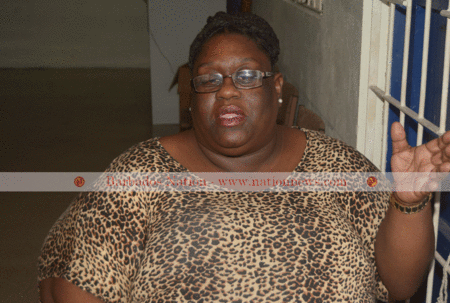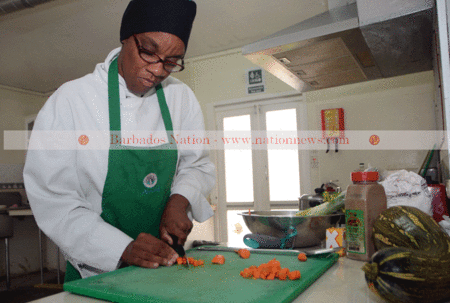WHEN RACQUEL SPRINGER started to lose her sight, she thought her life was over. That could not have been further from the truth. Springer eventually found the Barbados Association for the Blind and Deaf and today she remarks, “it has all gone uphill from there”.
Springer has advanced keratoconus, a progressive eye disease in which the normally round cornea thins and begins to bulge into a cone-like shape. This cone shape deflects light as it enters the eye on its way to the light-sensitive retina, causing distorted vision.
Since the diagnosis, she pursued the Caribbean Examinations Council’s Caribbean Secondary Education Certificate and passed four, including English A and office procedures at Grade I. She is currently doing information technology using computer software specially designed for the visually impaired and blind.
“I thought I would not even get one CXC,” she said. “I was done school for many years, and as a big woman with children I thought that opportunity had gone but when I came [to the association], the surroundings and the environment were good for me. The members do not let you give up, no matter what.”
Springer, who has sight in one eye, said she had an operation in June last year so the vision in the right eye is much better than before, but she is waiting for a corneal graft on her left eye, which she can barely see out of. Without her glasses everything is blurred, and before the surgery she could see shapes and figures only.
From the time Springer, who is now 40, was in secondary school she always had problems with her eyes, but her condition went undiagnosed for many years since it was dismissed as a virus.
“My eyes would water a lot and I would go to the polyclinic and they would give me eye drops and told me I had a virus,” she said. “They never really dug deeper.”
She noted that even though her eyes were always runny and she rubbed them a lot it did not affect her at school as she could see the chalkboard. In fact, she said she did not think of it as a disability: “I felt I was normal.”
It was not until 2000 that she received her diagnosis. By that time her condition was at an advanced stage and she had her first corneal transplant in 2012. Last year she had a cataract removed.
Springer was forced to give up her job as a cashier/gas attendant when the doctors told her not to continue.
“It threw me into denial,” she said. “To know, here I am, a person that could see all my life and then to know my sight was deteriorating as time went by. It made me sad and depressed so I did not go anywhere; I just stayed in the house every day.”
It was in 2012 that a friend had the foresight to sign Springer up with the National Disabilities Unit, from where she was put on to the Barbados Association for the Blind and Deaf. “I did not see myself as disabled,” she said. “I was really upset when [the officer] signed me up. But I was judging it before I even got involved.”
Springer said the chance to interact with people going through similar or other challenges was a blessing.
Seeing blind people manoeuvring on their own, catching the bus, cooking and living alone inspired her. “I thought, ‘Well, if that person is blind and can do so much, what about me who can still see?’”
No equal opportunities
Springer has her eyes set on becoming a secretary or office assistant as she wants to put her qualifications to use. Failing that, she wants to get into counselling. She recently did an internship at the association and is hoping to get an opportunity through the job preparation programme of the Barbados National Organisation of the Disabled.
“We do not have equal opportunities and that is a problem,” she said. “Employers see you more as a liability rather than an asset.”
More academic qualifications are also in the works for Springer, who wants to move onto the full range of tertiary level institutions available on the island.
There are many things that Springer now does that she never pictured herself doing and she knows there are many more she will go on to do. “Even sitting to be interviewed here is something I would have never done. I am a lot more confident now.” Springer also said that she had always felt uncomfortable about her size and was pressured about it from the time she was in school.
She has now made a personal vow that, “It is all about me now. No matter what people may think or say, I want to better myself.”
Springer, the mother of four – daughters aged 19 and 17 and 15-year-old twin boys – said her children have helped her to reach this stage. In return she uses her life experience to show them that nothing is too hard.
This article is compliments the Nation News Paper
Article written by : Lisa King




 Ever heard the saying “it’s better to give than to receive” well that also applies to time. By volunteering we support an organization or cause and make a great difference in our communities. It’s also a great way to meet new people and learn about the challenges they face daily. Consider giving more than just money, give your time !
Ever heard the saying “it’s better to give than to receive” well that also applies to time. By volunteering we support an organization or cause and make a great difference in our communities. It’s also a great way to meet new people and learn about the challenges they face daily. Consider giving more than just money, give your time !

